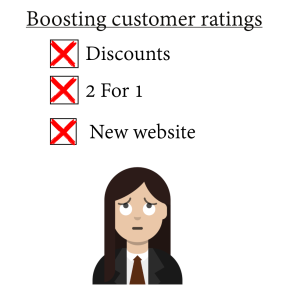Reflecting on problems
Reflect
- Which of the strategies covered in this chapter have you used before?
- Which of the strategies do you think you will try next time you’re faced with a problem?
- Why do you think it is useful to reflect on how you tried to solve a problem and the outcome?
Reflection allows you to delve deeper into the problem, gaining a better understanding of its various aspects, causes, and potential solutions. This deeper understanding can lead to more effective problem-solving. Not only does reflecting on problems help us solve them, but reflecting on the steps we took to solve a problem and whether or not we were successful makes tackling issues much easier the next time they arise. It also gives us more confidence in our ability to deal with future problems.
Whichever strategy you employ to solve a problem, it’s a good idea to take some time to reflect on how things turned out and whether the problem-solving strategy you used was the right one.

For example:
Yu is trying to improve customer ratings. She’s used the trial-and-error strategy, but so far nothing has worked satisfactorily. She reflects on her approach and thinks carefully about why the ‘trials’ haven’t been successful. She realises that her solutions haven’t addressed the root of the problem. Yu decides to use the 5 Whys strategy instead, to find the cause and fix it. If she hadn’t reflected on her problem-solving process, she would have continued coming up with surface-level solutions.
Consider these questions when reflecting on a problem and your problem-solving process:
- What worked and what didn’t?
- What would you do the same and what you would change if you had your time over?
- How will these insights help you in the future?
Let’s practise doing a reflection together
If you’d like to learn more about reflective thinking in your studies, everyday life, and work, check out the Reflective thinking and practice chapter.
Having explored this chapter, you’re now on your way to becoming an expert troubleshooter. As we’ve seen in this chapter, there are all sorts of problems, and luckily there are also many problem-solving strategies. Being able to choose the right strategy or technique to solve a problem is a useful skill for many situations in life and across all disciplines.

